| Srl | Item |
| 1 |
ID:
155886
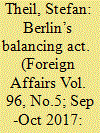

|
|
|
| 2 |
ID:
085122
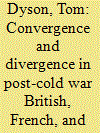

|
|
|
|
|
| Publication |
2008.
|
| Summary/Abstract |
Post-Cold War military reforms in Britain, France, and Germany have been characterized by patterns of convergence in the objectives, instruments, and institutional forums of defense policy but by divergence in temporality. These patterns of convergence and divergence cannot be fully explained by cultural approaches. Neither can they be explained solely by a focus on the role of international structure, as neo-realism posits, although the post-Cold War distribution of capabilities is driving Britain, France, and Germany toward policy convergence. Instead, the analysis builds upon the insights of neoclassical realism. Culture emerges not so much as a cause of action as instrumental and a resource for policy leaders in the domestic political and temporal management of reform.
|
|
|
|
|
|
|
|
|
|
|
|
|
|
|
|
| 3 |
ID:
103299
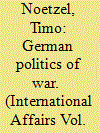

|
|
|
|
|
| Publication |
2011.
|
| Summary/Abstract |
This article analyses the way in which Germany's participation in the international intervention in Afghanistan has shaped and transformed the country's politics of defence and deriving policies. It argues that in the wake of operational challenges posed by the insurgency in northern Afghanistan since 2007, and in particular the increasing rate of German combat fatalities, established post-Cold War dogmas of German politics are becoming subject to erosion. Developments in the Kunduz region of northern Afghanistan, with the tanker bombing of 4 September 2009 as its apex, have had a catalyst function in this process. In particular, strategic, operational and tactical requirements for counterinsurgency operations have had significant politico-strategic repercussions for the country's defence and security policy more generally. As a result, in recent years the Bundeswehr has begun to undergo a far-reaching structural process of military adaptation and innovation. The article explains and analyses this phenomenon of political change and military learning in the context of political paralysis.
|
|
|
|
|
|
|
|
|
|
|
|
|
|
|
|
| 4 |
ID:
115523
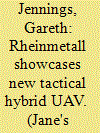

|
|
|
| 5 |
ID:
173943
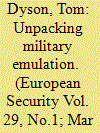

|
|
|
|
|
| Summary/Abstract |
Which organisational activities promote effective military emulation? Which variables facilitate and impede the emergence of these activities? Drawing upon the academic literatures on military change and management studies, as well as semi-structured interviews within the British and German militaries, this article identifies five key organisational activities which promote effective inter-organisational doctrinal learning. In doing so, the article improves understanding of the contribution that management studies can make to multi-disciplinary scholarship on military learning. The article examines the variables which facilitate the emergence of activities which support effective inter-organisational doctrinal learning through a case study of Bundeswehr doctrinal absorptive capacity during ISAF. It also explores the impact of these activities on doctrine development. The article demonstrates the crucial importance of active and well-informed civilian oversight of the activities which support military learning.
|
|
|
|
|
|
|
|
|
|
|
|
|
|
|
|